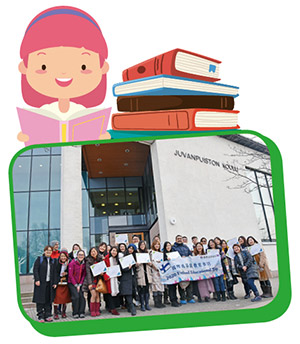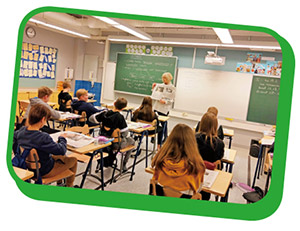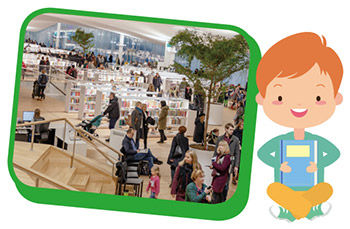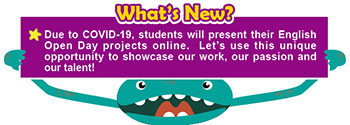
The Secret to Finnish Education
國際處主任 賴國宜
Finland continuously excels in reading, science and mathematics on the Program for International Student Assessment (PISA). What's so great about education in Finland? There are many factors that contribute to the success of the education system in Finland, and we believe that its cultural attitude towards children's education makes a major difference. Ms. Helen shares her observations of how schools and parents in Finland nurture children's enthusiasm and enjoyment in reading. So next time, before you ask your child to read, put away your cell phone and read with them. You will be surprised at the impact this will make on your child's literacy performance.
2001年芬蘭在國際學生評量(PISA)的閱讀、數學和科學三方面都名列第一,自此,芬蘭教育吸引了全球的關注。今年寒假,在李董事長和許校長的支持下,國際處20幾位中外師到芬蘭觀摩當地的小學教育。傳統的思維中,要有好的學習成績,非得勤學苦讀,然而,我們觀察到芬蘭的中小學,上學時間比台灣短、家庭作業也比較少、學校也不太做標準測驗,他們如何取得足以與高壓學習的亞洲學生抗衡的成績?我們發現其中最大的因素是「心態」,芬蘭教育不強調「競爭」,而是專注於「讓孩子成為最好的自己」,他們認為教育不僅僅是「知識的學習」,而是「對生命成長的關注」。本期邀請Ms. Helen分享,芬蘭的老師和家長如何陪伴孩子閱讀和享受閱讀。如果閱讀只是為了好成績,考完試,孩子自然放棄閱讀。當閱讀成為最重要的日常活動,每天都樂在其中,閱讀能力自然不斷提升。
社區公園是孩子最常光臨的戶外活動場地,如果孩子可以為自己和家人設計公園,會是什麼樣子?Mr. Duke分享四年級的「公園設計」專題,歡迎您一起來看看孩子們心中理想的公園設施和活動,為因防疫只能待在家裡的日子,增添些許想像戶外活動的樂趣。


~ Helen Lin
English Teacher, International Department
In 2000, the Finnish education system drew international attention after its Program for International Student Assessment (PISA) results were released, revealing that Finnish students were the best young readers in the world. Eighteen years later, Finnish students remain one of the highest performers in reading. In a time when children’s reading habits are declining globally, how do children in Finland still read so well?
Over this past winter vacation, a group of Kang Chiao teachers embarked on a quest to Finland searching for answers. We exchanged ideas with Finnish principals and educators, attended professional development workshops, and visited schools. In one of the Finnish classes we audited, students were reading the day’s newspaper and learning about media language convention. The objective was to understand the news and learn to discuss current events.

A Virtuous Reading Cycle Fueled by Reading Enjoyment
Our research extended beyond Finnish schools and classrooms. We also visited the world-famous Helsinki Central Library Oodi. Following the escalator up to the library’s second floor, we saw a mother snuggling with her toddler with a book between them. Meanwhile, a long line of parents and children were dressed in wizards’ robes, waiting anxiously for the library’s evening event - Harry Potter Night. It dawned on us that the secret to Finnish children’s literacy performance lies not within its education system but the Finn’s cultural attitude towards reading.

While many of us associate reading with schooling, the Finns focus more on its entertainment value. On average, Finnish adults spend 20 minutes daily reading recreationally, and research suggests that Finnish parents’ reading habits are strongly linked to their children’s literacy performance. When children see their parents reading a lot, they, too, develop a passion for books. Rather than learning how to read, Finnish children read to learn. This positive attitude towards reading motivates them to read more, and because they read more, they read better. When they read better, they want to read more because they feel a sense of accomplishment. Such experiences of success in reading from a young age have resulted in a virtuous cycle that builds lifelong readers in Finland.
Cultivating Good Reading Habits at School
In Kang Chiao, teachers seek to create opportunities for positive reading experiences. In first and second grade, some teachers set up comfortable reading corners where students can read after they finish their work. Doing so helps children to associate reading with relaxation.
From third to sixth grade, students use Chromebooks to access myON reader, which personalizes reading based on interests and reading levels. Students can also explore books from a varied genre selection and find the ones that excite them. Giving children a choice in their book selection helps them to acquire a positive reader identity by taking more control over their reading habits.
Reading Encouragement at Home
As the famous saying goes, “Rome wasn’t built in a day.” Important work takes time; important habits require practice, both at school and at home. Finnish children practice literate behavior from a young age. They are such good readers because they learn from those dearest to them - their parents.
The next time you are looking for a fun family activity, pick up a book, find a cozy spot in the house, and invite your children to read. Our school’s Monthly Must-Read books are great starters for interactive reading. You can read to or with your kids, and use the books’ topics as a platform for conversation. You will be amazed at how this family reading time can create a habit of reading and a special bond with your children!

![]() 全文下載)
全文下載)